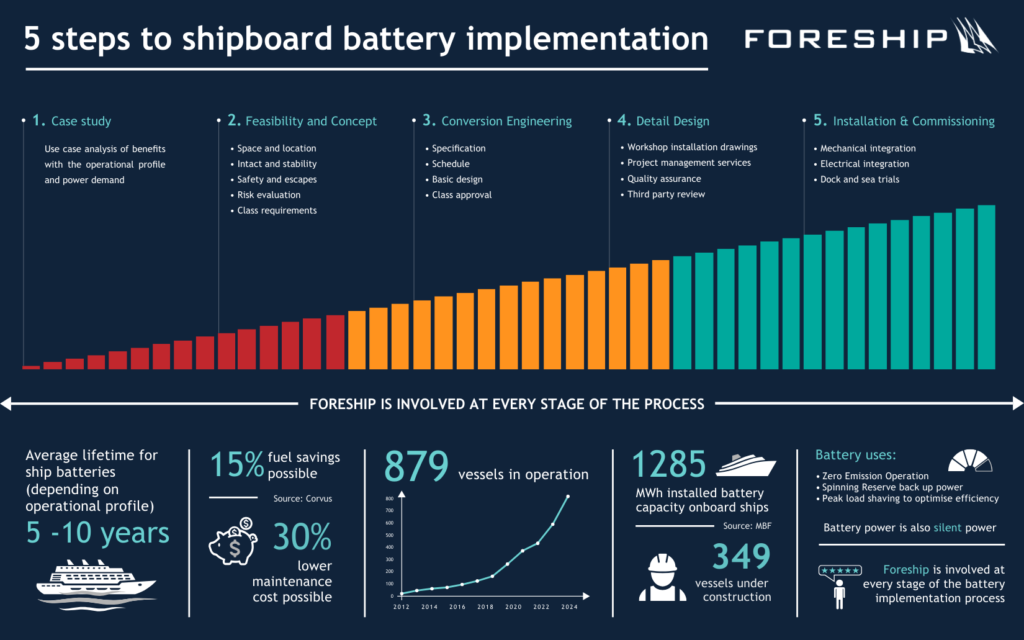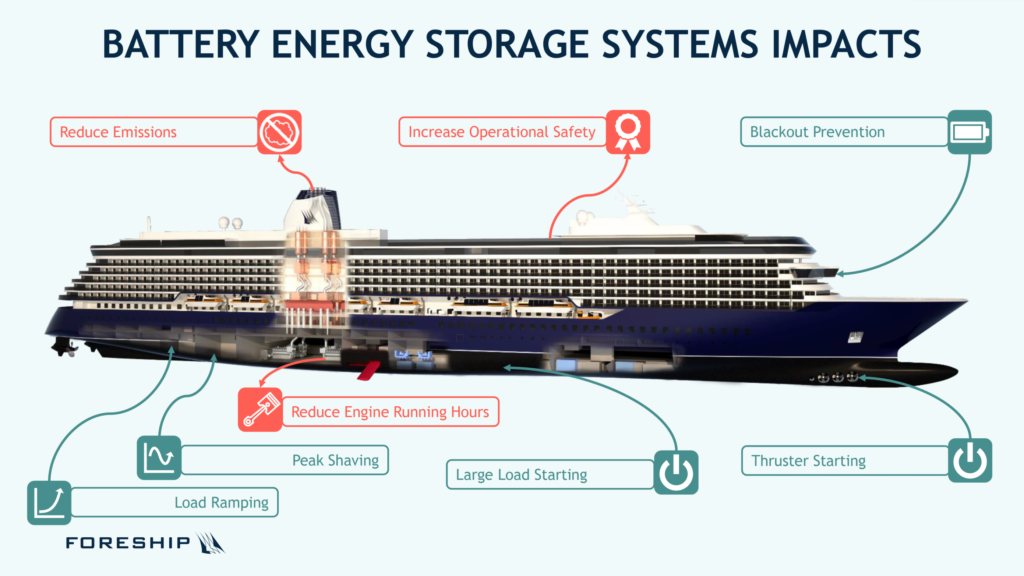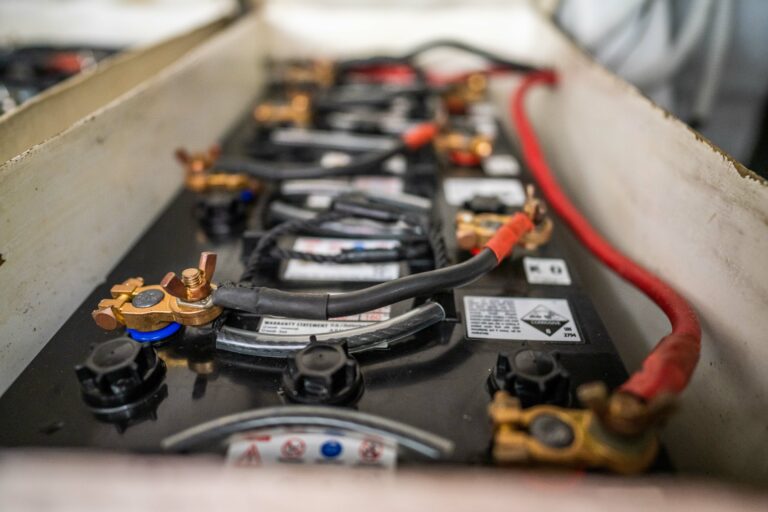Battery technology is widespread, and its use continues to grow strongly in power systems for new ships. For Shaun White, managing director of Foreship UK, recent advancements in safety regulations and standardization hold the key to reviving the retrofit market.
The latest figures from the Maritime Battery Forum (MBF) show the number of ships featuring battery technology is still climbing but the growth of retrofit projects has fallen. By the end of 2023, MBF reported 1,054 seagoing vessels included batteries as part of their power systems, with a combined output of 883MWh. However, while retrofits and new-build projects followed a similar growth path to 2019, by last year retrofits contributed only 24% of installations and in 2023 itself, the retrofit share fell further to 11% (29 ships) of 240 battery projects.
MBF indicates that shipowners and forum members attributed the retrofit slowdown in part to Covid-19, with increasing capital equipment costs, high installation expenses and safety worries also cited. These obstacles, combined with the ongoing challenge of locating appropriate space for batteries on current vessels, led many owners to postpone or put off investments in battery technology. MBF also believes steps that aim to simplify installations and create a safety framework for the maritime battery sector can help overcome key points of concern for owners about battery retrofits.
Battery recharge
Shaun White, managing director of Foreship UK, has been a strong supporter of maritime battery systems for a long time. He emphasizes the important role advancing safety measures and establishing standards can play in addressing misconceptions that have hindered the recognized benefits of installing ship-board energy storage solutions.
 White says, “The maritime battery is often misunderstood, with many believing that a sizable battery is necessary for environmental and operational advantages, leading to cost, space and safety concerns. Consequently, proposals for projects face difficulties in obtaining necessary approvals and moving forward with implementation.”
White says, “The maritime battery is often misunderstood, with many believing that a sizable battery is necessary for environmental and operational advantages, leading to cost, space and safety concerns. Consequently, proposals for projects face difficulties in obtaining necessary approvals and moving forward with implementation.”
According to the executive, the maritime battery retrofit market is caught in an ongoing cycle where the price point does not decrease because of limited adoption, and limited adoption persists due to the high price point.
“Foreship collaborates with owners on battery projects continuously, covering everything from feasibility studies and detailed design to installation supervision. Doing so has involved working ahead of regulations to make battery systems safer, more dependable, and better designed.
“Constant technological development makes it critical that the maritime industry adopts safe and uniform standards, based on well-understood, industry-driven guidelines,” continues White. “Safety and standardization will be key for confidence in and the wider uptake of ship-board battery technology.”
 In its first EMSA Guidance on the Safety of Battery Energy Storage Systems (BESS) on board ships, published in 2023, Europe’s maritime safety organization noted, “There is no regulatory instrument at international level on the safety aspects of using batteries in ships. This important scope has been left to and evolved through the requirements of class, industry standards and codes with limited requirements and experience from… flag states.”
In its first EMSA Guidance on the Safety of Battery Energy Storage Systems (BESS) on board ships, published in 2023, Europe’s maritime safety organization noted, “There is no regulatory instrument at international level on the safety aspects of using batteries in ships. This important scope has been left to and evolved through the requirements of class, industry standards and codes with limited requirements and experience from… flag states.”
Foreship was also among the stakeholders consulted on the functional requirements for risk mitigation included in the new EMSA guidance, as both an invited participant and through its participation in the MBF. The resulting document goes beyond batteries and their integration, to include the design, installation and operation of systems, White states.
“This guidance offers a significant step forward for assurance of the monitoring, management and protection of battery safety which will encourage a wider pool of owners to consider the advantages inherent in battery systems,” he says. Recommendations cover training and operational procedures, ventilation, fire safety, systems testing and maintenance and relevant ship-board spaces.
Lessons learned and leadership
Foreship has also contributed directly to emerging maritime guidance and industry best practices for batteries, and to developing recommended standards so that battery systems are harmonized. It was one of the 21-strong group of expert organizations consulted to develop the MBF’s first Firefighting Guideline for Maritime Battery Systems, published in October 2023, detailing techniques and strategies to deal with battery systems fires on board hybrid and electric ships.
The company has also been highly influential among the 28 organizations contributing to MBF’s Guideline towards Standardisation of Containerized Maritime Battery Systems, whose publication is expected to accelerate the adoption of both fixed and swappable shipboard batteries.
Syb ten Cate Hoedemaker, managing director of Maritime Battery Forum, comments, “The value that Foreship brings as an active member of the MBF is not only that they put effort into investigating the possibilities for batteries on ships that might not seem obvious at first sight. They are also open in sharing their insights, experience and lessons learned from these challenging projects.”
White adds, “The work done by both the MBF and EMSA is excellent progress to aligning the maritime industry and addressing safety concerns. Optimizing battery technology for its performance and safety demands requires a holistic approach taking into account the risk-based scenarios on ship integration, safer locations and arrangements for battery spaces, and mitigation on fire safety, gas detection and firefighting systems.”
 He also highlights that Foreship is increasingly using a data-driven design approach based on owner operating profiles to size batteries more precisely and make better decisions on their role and capabilities, and on their location.
He also highlights that Foreship is increasingly using a data-driven design approach based on owner operating profiles to size batteries more precisely and make better decisions on their role and capabilities, and on their location.
This approach can be used to better identify the full potential of a retrofit case, by evaluating the battery system for its contribution to the overall flexibility and optimization of the power system. An optimally sized battery can have widespread positive impacts – on engine efficiency, emissions reduction and safety; and in its use for peak shaving, load ramping or as a spinning reserve.
To conclude, White asserts that batteries are a proven technology that contributes to achieving reduced emissions during ship operations while enhancing the efficiency of many alternative ship fuels and sources of power it works with.
For more key legislation updates from the electric and hybrid marine technology industry, click here.



